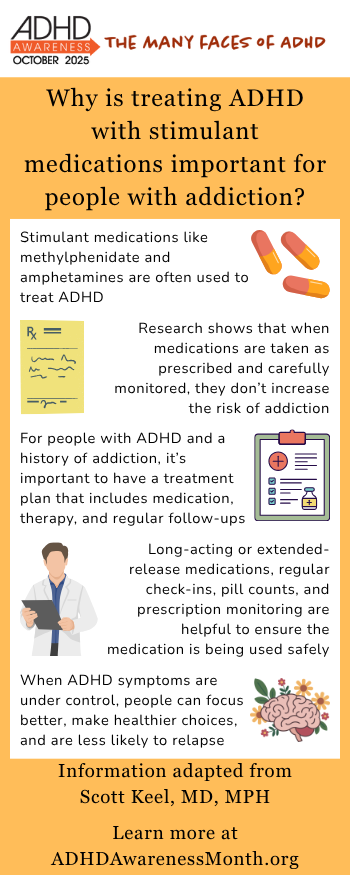Stimulant medications can help control ADHD symptoms and may lower the risk of relapse in people with addiction, especially when combined with other supports. Using long-acting medications and regular check-ins helps keep treatment safe and effective.
Stimulant medications like methylphenidate and amphetamines are often used to treat ADHD. Some people worry that these medicines might make addiction worse, especially for those who have struggled with substance use in the past. But research shows that when these medications are taken as prescribed and carefully monitored, they don’t increase the risk of addiction. In fact, treating ADHD can actually help people stay on track and avoid falling back into old habits.
For people who have both ADHD and a history of addiction, it’s important to have a treatment plan that includes medication, therapy, and regular follow-ups. Doctors usually recommend long-acting or extended-release medications because they’re less likely to be misused. Regular check-ins, pill counts, and prescription monitoring are also helpful to make sure the medication is being used safely.
When ADHD symptoms are under control, people can focus better, make healthier choices, and are less likely to relapse. Treating ADHD the right way can be a key part of staying healthy and avoiding addictions or relapse in the future. When we are properly managing our ADHD symptoms, it directly impacts our self-esteem and confidence.
About the Author

Scott Keel MD MPH is a board certified physician practicing in Virginia, USA and medical director of Even Keel Health PLLC, an integrative and lifestyle medicine clinic that specializes in the diagnosis and management of ADHD in children and adults and the treatment and prevent of addiction, as well as other psychological, emotional, & behavioral health issues. He is also the medical director of the non-profit, Even Keel Health Partners.
Read more
- JAMA Psychiatry: Association Between Stimulant Treatment and Substance Use Through Adolescence Into Early Adulthood
- Pediatrics: Attention-Deficit/Hyperactivity Disorder and Substance Abuse
- Journal of Addiction Medicine: The ASAM/AAAP Clinical Practice Guideline on the Management of Stimulant Use Disorder
- The Journal of Clinical Psychiatry: Treatments and Treatment Predictors in Patients With Substance Use Disorders and Comorbid ADHD
- Current Psychiatry Reports: Towards Precision Addiction Treatment: New Findings in Co-morbid Substance Use and ADHD
- Journal of the American Academy of Child and Adolescent Psychiatry: Systematic Review: How the ADHD Polygenic Risk Score Adds to Our Understanding of ADHD and Associated Traits

